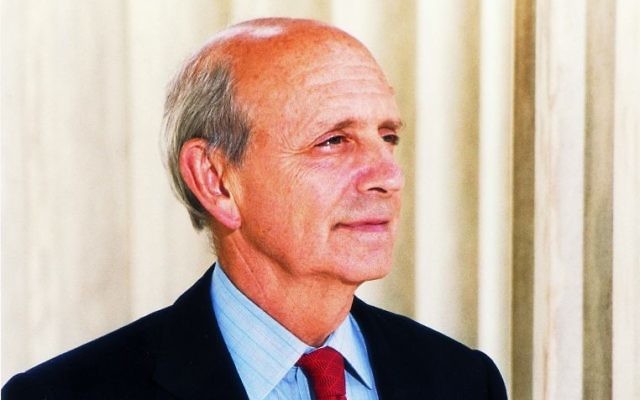Justice Stephen Breyer: Rule of Law a ‘Tremendous Asset’
Justice Stephen Breyer will kick off the 26th Book Festival of the Marcus Jewish Community Center on Saturday, Nov. 4.
U.S. Supreme Court Justice Stephen Breyer has served 23 years on the nation’s highest court, and he has seen how decisions made in other countries affect rulings in America. He addresses that international influence in his book “The Court and the World: American Law and the New Global Realities.”
Breyer, who will open the 26th Book Festival of the Marcus Jewish Community Center at 8:15 p.m. Saturday, Nov. 4 — tickets are $30 for JCC members and $35 for others, including a copy of the paperback of the book — spoke with the AJT on Friday, Oct. 20.
AJT: Why did you write this book, and to whom is it addressed?
Breyer: I wanted to write it because the books I’ve written are to explain through example what the Supreme Court does. I was interested in showing people the way in which the globalized word, the world abroad, affects cases and what that means concretely for the Supreme Court. If you look at what we’re actually deciding, you will see there are many more cases in which you need to know foreign law to decide the American law correctly — civil liberties, terrorism, all kinds of things. I noticed when I started on the court that there a handful of cases where you really had to know what was happening abroad to get the case decided correctly; now (it’s) 20 to 25 percent of the cases, such as gay rights or death penalty. In some of those cases, sometimes authors have referred to foreign law. There’s displacement. You’re angry at A, so you blame B. I thought we should hear the death penalty. I think I put two pages in about what is happening abroad.
AJT: What message do you want to get to the public about the court and its role in 21st century?
Breyer: I want people to just have a very basic understanding of what we do. I’m there every day, and I see it all the time. I want them to at least have a glimmer of this. We are a country of 320 million people. We’re every race and religion. Despite those differences, we’ve managed to stick together. It’s a miracle. One of the things that has held us together is the rule of law. We will accept decisions, even if we think they’re wrong. I want them to see what a great thing this is, the tradition. It’s a tremendous asset for the United States.
AJT: What are some common misconceptions about the court?
Breyer: About half the time we’re unanimous. It’s 5-4 about 20 percent of the time, and it’s not always the same five or the same four. I went back and looked at the number of times (Justice Antonin) Scalia’s vote would have made a difference. It was about four to five out of 75.
AJT: How well are the checks and balances working in Washington?
Breyer: I know our court, and I hope our court is working well. We do our job.
AJT: Are there concerns about the court becoming too politicized or about decisions the court has already made?
Breyer: I doubt it’s any more politicized than it’s ever been. Different judges have come to different conclusions on federal law. Otherwise, we wouldn’t be hearing the case. The Constitution doesn’t give a precise meaning of the freedom of speech. So we’ll have cases from a pharmaceutical company who wants to advertise or violence on videos. It’s very hard to say from the language of the Constitution what the answer is. That’s usually true even of the precedents and historical background. If you have a judicial philosophy that puts a lot of weight on history at the time that it was written, and you think it’s less likely to answer the question, then you should answer the values that underlie the particular position. You might come to different answers. That’s not politics.
AJT: What do you hope your legacy on the court will be?
Breyer: I really have no idea. That’s for other people to say. I read somewhere that Thurgood Marshall, when asked this question, said that he hoped (people would say) he did his best. I think that’s a good motto.





comments